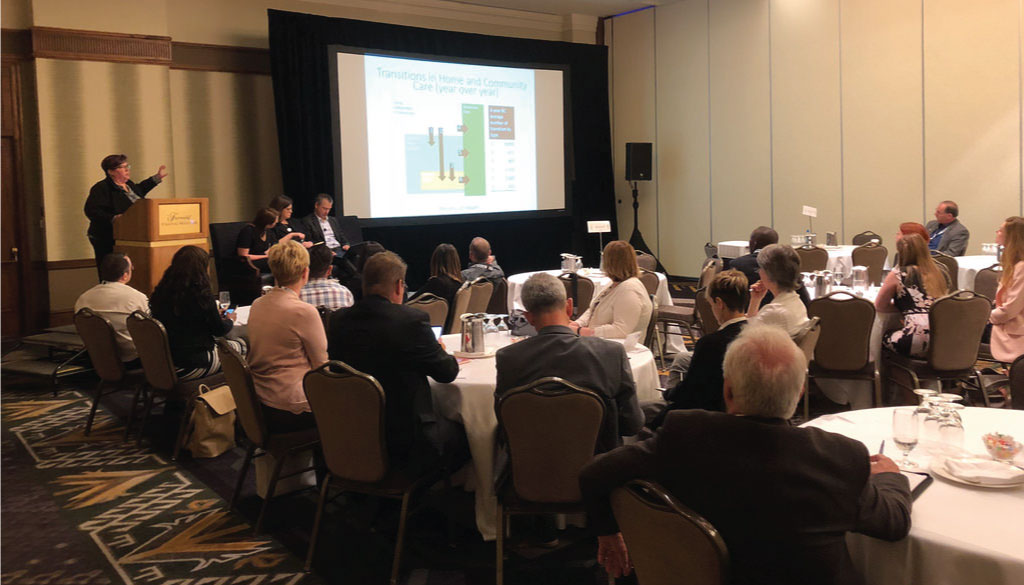BCCPA’s 2018 Annual Conference featured a panel on assisted living, including Sharon Stewart, Executive Director, Seniors Services at the Ministry of Health, Ron Pike, Executive Director of Elim Village and past BCCPA Board Member, as well as Dr. Kimberlyn McGrail who is an Associate Professor at UBC in the School of Population and Public Health and the Centre for Health Services, as well as the Policy Research and Scientific Director of Population Data BC and Data Director for the new BC Academic Health Sciences Network.
This panel followed the landmark report on assisted living – the Assisted Living Tenancy Task Force Review (the “Task Force”) – as well as BCCPA’s fall listening tour and January’s forum on assisted living. The session intended to provide updates on the implementation of Bill 16, invite a dialogue between stakeholders in attendance and provide attendees with opportunities to ask questions.
In preparing their presentations panellists were asked to focus on the questions: “How do we best serve the seniors who are in-between?”; “What will the future of assisted living look like after the introduction of Bill 16?”; and “What opportunities might Bill 16 hold for residents, care providers and the continuing care sector?”
The panel began with a demographic overview provided by Dr. McGrail, through which she highlighted some pertinent trends including an aging population, fertility rates which began to dive following the 1960’s, an increased likelihood that children and parents live further away from each other and reduced public spending on home health and long-term care. Dr. McGrail also painted a picture of what the “typical” assisted resident looks like – most often female (73 per cent), 83 years old on average and very unlikely (95 per cent) to be married.
While Dr. McGrail notes that assisted living suites have increased over recent years, this growth is mitigated by population increases and has largely occurred in the private-pay portion of the assisted living sector.
Dr. McGrail was followed by Ron Pike, who spoke to the challenges and opportunities observed from a provider’s perspective. Pike notes that assisted living homes, like Elim, are delivering more care than originally anticipated, are experiencing heavier “wear and tear” on their buildings, do not necessarily have the space for walkers around dining areas, and must consider long term capital replacement considerations including changes to technology, renovations and reconfigurations. This is further complicated by a housing market which is outpacing funding levels.
Looking into the future Pike notes that the future of assisted living will require collaboration across various partners, including BC Housing, creativity and funding which needs to come from a variety of sources. Further, there will have to be a consideration of where care ends and where housing begins.
Finally, Sharon Stewart spoke from the perspective of the Ministry of Health on upcoming changes resulting from Bill 16. As BCCPA members will know, amendments to the Community Care and Assisted Living Act (CCALA) were announced March 7, 2016 and received Royal Assent on May 19, 2016. Practice changes are expected to start occurring after new provisions are brought into force, likely in April 2019. Education is expected to start early in the 2019 new year.
Stewart walked providers through the intent of the legislation, along with the primary changes:
- Assisted Living residents are currently supported with no more than two prescribed personal services. Under the legislative changes, the limit of two services will be removed, enabling more people to qualify for Assisted Living, provided that residents:
- Can make decisions on their own behalf or live with a spouse who can make decisions on their behalf;
- Can recognize an emergency, take steps to protect themselves in an emergency or follow directions in an emergency;
- Do not exhibit behavior that jeopardizes the health and safety of others, and;
- Do not require continual unscheduled professional health services.
Stewart clarified that no assisted living home will be required to offer all six services, but that Health Authorities will need to look at jurisdictional needs when considering contracts.
The BCCPA looks forward to working with the Ministry of Health and other partners throughout the implementation of Bill 16 and will continue to recommend that:
- The health authorities, BC Housing and BCCPA review Assisted Living Tenancy Agreements to standardize agreements across operators across the province.
- That a review of the funding approach to allow for consistency within the sector, decreased https://bccare.ca/wp-content/uploads/2022/08/medcare-img22.jpgistrative burden and flexibility to support the continuum of care for seniors take place.
- That a review be performed to understand current and future roles and responsibilities of BC Housing, health authorities and operators.
- That the Ministry of Health explore the introduction of a care credit model for Assisted Living using best practices from Community Living BC.
BCCPA would like to thank the panellists for their participation in our 41st Annual Conference. Presentations will be made available to conference attendees.





